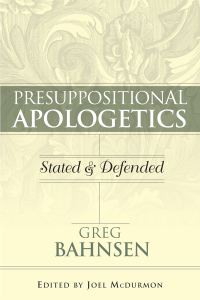Choosing Hats
-
The Portable Presuppositionalist
Our friend Jamin Hubner at http://www.realapologetics.org/ has taken great pains to put together a much needed book on the topic of…you guessed it, presuppositional apologetics! The book includes, among other things, a handful of articles written by contributors to this blog. I was shocked at how reasonable the price is as well. http://amzn.com/1439219915 Take a look and order it today!…
-
A Very Brief Response To Bahnsen Burner Concerning Conditions Of Knowledge
Unfortunately I see the recent response from Dawson Bethrick (available on his blog) as a lengthy discussion of topics rather irrelevant to the points I raised in my post that he is allegedly responding to concerning Conditions of Knowledge. I am at a loss as to why someone familiar with the topic at hand would understand my post as something other than a discussion of problems related specifically to a materialist understanding of the world.
When we speak of ‘belief in a proposition’ we usually mean ‘belief that a proposition is true’, not a belief that the proposition itself exists! …
-
A friendly chat in simple terms.
Chris: You are an unbeliever?
Unbeliever: I’ll say for argument sake that I am.
Chris: For argument sake?
Unbeliever: Yes it’s complicated. lol
Chris: How so?
Unbeliever: I’m confused. Put it that way.
Chris: I see. Would you say you believe in God?
Unbeliever: I’m open to the possibilities.
Chris: So, you attend church every other Sunday?
Unbeliever: No. I stopped going to church.
Chris: That does not sound very safe. Or open.
Unbeliever: You’re right.
Chris: So really, you live as though there is no God?
Unbeliever: I haven’t really been seeking.
Chris: So what would it take? For … -
Conditions of Knowledge
In order for you to know something, it must be true, you must believe it, and you must have some kind of warrant for it.
Believing occurs inside of you, and belief is “about” something. My computer desk cannot be about some other idea. A piece of raw meat cannot be about Hector Berlioz. However a belief can be about Hector Berlioz. “Hector Berlioz wrote thematic music” is a belief about Hector Berlioz. It would appear that desks, meat, and other such natural objects do not share this feature with beliefs (“aboutness”). It appears that beliefs are not reducible to …
-
Do we know anything at all?
If we are going to be able to think about anything at all, we have to start somewhere. Where do we start then, and why? If we do not know, then can we think anything at all (intelligibly)?
There appears to be no universal consent on any fact of existence; facts do not appear to speak for themselves, they must be interpreted, else everyone would agree and as already said they do not.
You have made mistakes before, why not again? How do you know that you are not making a mistake even now? Remember those things you felt so …
-
Snakes and Slaves
Question: “I am curious what the valid response is to someone in regards of the talking snake. The apologetic response.”
Basically we can only know that the world has regularities because God is in control of it. If God was not in control of it, or did not reveal to us that He is, then we would not be able to predict that the next snake we encounter cannot talk. (It was a serpent by the way.) So if you reject the account in Scripture you have no reason to reject a snake talking. If you accept the account in …
-
A New Book By Greg Bahnsen
No one I know has read this book yet. This is probably because most of the people I know have not realized that this book is available. Thanks to Brian Knapp for bringing this to my attention.
… -
Why am I still a Christian? Some Observations With C.S. Lewis
“I believe in Christianity as I believe that the sun has risen: not only because I see it, but because by it I see everything else.”
This was written by C.S. Lewis. Now what in the world did he mean by this? Hopefully, this short piece will help you understand what he meant by this, if I have understood him correctly and if I am right that I can relate to what he meant by this statement.
Lewis says that he can see Christianity. By this I take him to mean that he believes in Christianity and experiences the truth …
-
The Discussion (Part II) – The Refutation
Continuing on with the conversation I documented below … here is the refutation I provided:
================
I want to answer two points in your testimonial – your pragmatic approach to belief in the reliability of senses, and the question of measuring leaps of faith. I will respond to these in reverse order, because you clearly appeal to the former in supporting the latter.
On measuring “leaps”:
In your testimonial you make the claim “your leap however is considerably wider than mine.” There are two points worth mentioning here. First, such a claim implies a standard by which you are evaluating …
